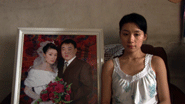Composed as parallel narratives on the status of women in the capitalist-fueled, rapidly expanding economy of contemporary China – one, a fictional account of Li Yueying (Yao Qianyu), a working class young woman and her search for a better life; the other, a documentary on Jenny, a middle-class housewife and mother undergoing a divorce – Emily Tang’s A Perfect Life follows in the vein of Wang Bing and Jia Zhangke in presenting a cultural portrait of the “other” China. Estranged from her parents, disconnected from her coddled, slacker brother, and drifting from one low paying job to another as she chases after job opportunities, Yueying’s story is, in a way, a metaphor for China itself in her rootlessness, ambition, and facility for constant reinvention (During the course of the film, Li appears as an aspiring performer, prosthetic factory worker, hotel maid, flight attendant impostor, bride, shopkeeper, and lover). Similarly, Jenny’s story embodies the insecurity and disempowerment that comes with profound cultural transformation. Compelled to re-enter the workplace after her increasingly messy divorce, her gradual slide into poverty is implied in her constant job hunting and in the milieu of her interviews that shift from a comfortable Hong Kong apartment to a rented dormitory bunk bed near a dance hall. By capturing a seemingly mundane encounter between the two women at Yueying’s shop (Tang ingeniously keeps Yueying out of frame until Jenny leaves the store to maintain the narrative distinction), Tang insightfully reflects on their interconnected destinies – a dissolution of the bounds between reality and fiction that culminates in the image of Yueying posing with her wedding picture, figuratively rejecting and reinforcing her created image.
© Acquarello 2010. All rights reserved.
